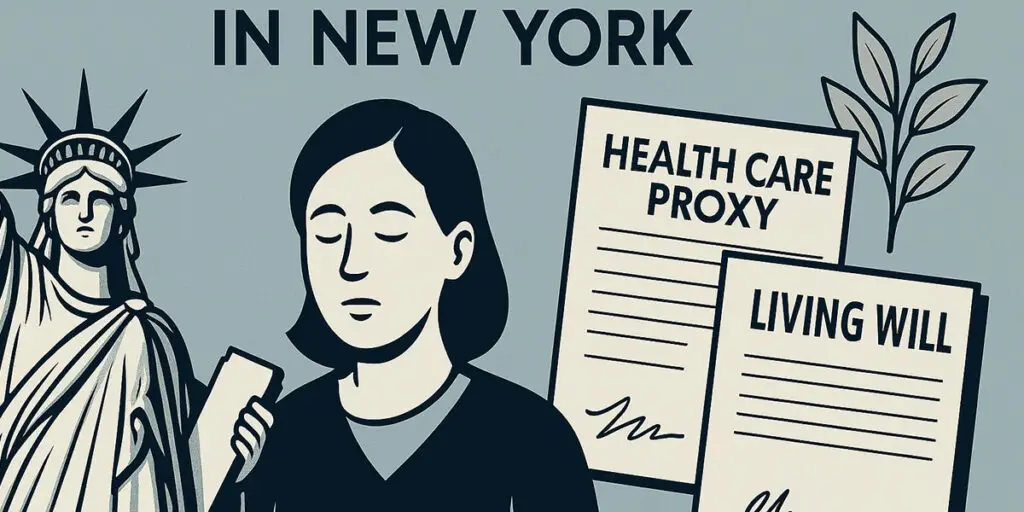Healthcare Proxies and Living Wills in New York: Making Your Wishes Known and Ensuring Respect for Your Healthcare Decisions
Planning for your future encompasses many aspects, and one of the most important is ensuring your healthcare wishes are known and respected, especially when you are unable to communicate them yourself. In New York, a healthcare proxy and a living will are two essential legal documents that allow you to do just that. These documents, often referred to as advance directives, enable you to appoint a trusted individual to make medical decisions on your behalf and to express your preferences for end-of-life care. At Morgan Legal Group, serving New York City and beyond, we are dedicated to helping individuals and families create comprehensive advance directives that reflect their values and ensure their healthcare wishes are honored. This guide will explore the key aspects of healthcare proxies and living wills in New York, providing valuable information on their purpose, benefits, how to create them, and why they are crucial for protecting your autonomy and ensuring your medical care aligns with your values.
What is a Healthcare Proxy?
A healthcare proxy is a legal document that allows you to appoint someone you trust, known as your healthcare agent, to make medical decisions on your behalf if you become unable to do so. This inability to make decisions can result from illness, injury, or any other condition that impairs your capacity to understand and communicate your healthcare choices. This designated healthcare agent then steps in to act on your behalf.
Your healthcare agent has the authority to consent to or refuse medical treatment, access your medical records, and make other healthcare decisions in accordance with your wishes and best interests. It is crucial to select someone who knows you well, understands your values, and is willing to advocate for your preferences. The right agent ensures your voice is heard when you can’t speak for yourself. This role is pivotal in safeguarding your autonomy and ensuring your medical care aligns with your values.
What is a Living Will?
A living will, also referred to as an advance directive, is a written statement that outlines your wishes regarding medical treatment in the event of a terminal illness or injury, especially when you are unable to communicate your decisions. This document serves as a guide for your healthcare providers and family, outlining your preferences for end-of-life care. It allows you to specify the types of medical treatment you want to receive or refuse, such as life-sustaining treatment, artificial nutrition and hydration, and pain management. This clarity is essential to ensure your desires are respected.
A living will provides clear guidance to your healthcare providers and your family about your preferences for medical treatment, ensuring that your wishes are respected, even when you cannot speak for yourself. It is important to be as specific as possible in your living will to avoid any ambiguity or confusion. It must also align with New York healthcare law. Precision and adherence to legal standards are crucial for its effectiveness.
Key Differences Between a Healthcare Proxy and a Living Will
While both a healthcare proxy and a living will serve as advance directives, they operate in distinct ways and address different aspects of healthcare decision-making. Understanding these differences is crucial for creating a comprehensive plan that protects your autonomy and ensures your wishes are honored. It allows you to strategically use each document.
- Healthcare Proxy: Focuses on appointing a trusted individual (your agent) to make medical decisions on your behalf when you are unable to do so. The agent can make a wide range of decisions based on their understanding of your values and preferences.
- Living Will: Focuses on outlining your specific wishes regarding medical treatment in the event of a terminal illness or injury. It provides direct instructions to healthcare providers and family about your preferences for end-of-life care.
In essence, a healthcare proxy empowers someone you trust to make decisions, while a living will outlines the specific decisions you want made. They work together to provide comprehensive guidance. A qualified attorney at Morgan Legal Group can help you navigate the nuances of these important documents.
Why You Need Both a Healthcare Proxy and a Living Will in New York
Having both a healthcare proxy and a living will offers the most comprehensive protection for your healthcare wishes in New York. While they may seem redundant, they serve distinct and complementary roles. A healthcare proxy provides the flexibility needed to address unforeseen medical situations, while a living will ensures your specific end-of-life preferences are honored. Together, they provide a clear and comprehensive roadmap for your medical care.
Benefits of having both documents include:
- Ensuring a trusted individual can make decisions if you are unable to communicate.
- Providing specific guidance for end-of-life care.
- Preventing disagreements among family members about your medical treatment.
- Offering peace of mind knowing your wishes are protected.
This dual approach offers the greatest security and protection for your autonomy.
Creating a Healthcare Proxy in New York: A Step-by-Step Guide
Creating a healthcare proxy in New York involves several key steps. First, you must complete a healthcare proxy form, which is available from the New York State Department of Health or from an attorney. This form requires you to name your healthcare agent and any alternate agents. Choosing an alternate ensures someone is available if your primary agent is unable to serve. It is important to thoughtfully consider who you trust most.
Second, you must sign the healthcare proxy form in the presence of two adult witnesses, or it must be acknowledged before a notary public. This step ensures the document is legally valid. Third, you should provide copies of the completed form to your healthcare agent, alternate agents, your primary care physician, and any other relevant healthcare providers. Keep a copy for your records. Distribution ensures everyone is aware of your wishes and the document’s existence.
Drafting a Living Will in New York: Key Provisions and Considerations
Drafting a living will requires careful consideration of your values, beliefs, and preferences for end-of-life care. It’s essential to express your wishes clearly and specifically to avoid any ambiguity or confusion. Consider the following key provisions:
- Your preferences regarding the use of life-sustaining treatment, such as mechanical ventilation, CPR, and artificial nutrition and hydration.
- Your wishes regarding pain management and comfort care.
- Your preferences for organ donation and autopsy.
- Any religious or ethical beliefs that may influence your healthcare decisions.
Discuss these provisions with your family and physician to ensure they understand your wishes and are prepared to honor them. Regular reviews and updates are also crucial. Open communication is paramount to ensuring your preferences are honored.
Choosing Your Healthcare Agent: Essential Qualities and Attributes
Selecting your healthcare agent is a pivotal decision that should be approached with careful consideration. Your agent will have the authority to make critical medical decisions on your behalf, so it’s essential to choose someone you trust implicitly and who understands your values and preferences. Key qualities and attributes to consider include:
- Trustworthiness and integrity
- Understanding of your values and beliefs
- Willingness to advocate for your wishes, even in difficult situations
- Ability to handle stress and emotional challenges
- Availability and willingness to communicate with healthcare providers and family members
Discuss your wishes with your potential agent to ensure they are prepared to fulfill this important role. The ideal agent is both trustworthy and capable.
When Do a Healthcare Proxy and Living Will Become Effective?
Understanding when your healthcare proxy and living will become effective is crucial for ensuring your wishes are honored at the appropriate time. A healthcare proxy goes into effect when your physician determines that you are unable to make your own medical decisions. This determination is based on your capacity to understand and communicate your healthcare choices. Until that point, you retain the right to make your own medical decisions.
A living will, on the other hand, typically goes into effect when you have a terminal condition and are unable to communicate your decisions. Your physician must certify that you have a terminal illness or injury before your living will can be implemented. These documents are designed to protect your autonomy when you are most vulnerable. Understanding these triggers ensures your wishes are respected.
What Happens If You Don’t Have a Healthcare Proxy or Living Will in New York?
If you do not have a healthcare proxy or living will in New York, your medical decisions will be made by a surrogate decision-maker. New York law designates a hierarchy of individuals who can serve as your surrogate, typically starting with your spouse, adult children, parents, or siblings. However, this process can be complex and may not always result in the outcome you would have preferred.
Furthermore, if there are disagreements among your family members about your medical care, it may be necessary to go to court to obtain a guardianship order. This can be a costly and time-consuming process. Having advance directives in place ensures that your wishes are known and respected, avoiding potential family disputes and legal complications. Proactive planning is always preferable to reactive solutions. Elder law attorneys at Morgan Legal Group can provide you with legal advice.
The Importance of Regular Reviews and Updates
Your healthcare proxy and living will should be reviewed and updated periodically to reflect changes in your life, values, and healthcare preferences. Major life events such as marriage, divorce, the birth of a child, or a serious illness should prompt a review of your advance directives. It’s also a good idea to review your advance directives at least every few years, even if there have been no major life changes. Life evolves, and so should your healthcare planning documents.
Regular reviews also allow you to:
- Ensure your chosen agent is still willing and able to serve
- Update your wishes regarding medical treatment
- Comply with any changes in New York law
Staying proactive helps ensure your wishes are always respected.
Common Misconceptions About Healthcare Proxies and Living Wills in New York
Several common misconceptions surround healthcare proxies and living wills, often preventing individuals from creating these essential documents. One misconception is that these documents are only for the elderly or those with serious illnesses. In reality, anyone over the age of 18 can benefit from having a healthcare proxy and living will. Accidents and unexpected illnesses can happen at any age, and it’s important to be prepared for the possibility that you may be unable to make your own medical decisions.
Another misconception is that you lose control over your medical decisions once you have a healthcare proxy or living will. In reality, you retain the right to make your own medical decisions as long as you are able to do so. Your advance directives only go into effect if you are unable to communicate your decisions. Don’t let misconceptions prevent you from protecting your healthcare wishes. Education is key to dispelling these myths.
The Role of an Attorney in Creating Your Advance Directives
While it is possible to create a healthcare proxy and living will on your own, working with an experienced attorney offers numerous benefits. An attorney can ensure that your documents are properly drafted and comply with New York law. They can also help you consider all relevant factors and make informed decisions that align with your values and preferences. Furthermore, an attorney can provide guidance in navigating complex family dynamics and potential disagreements about your medical care.
An attorney can also:
- Explain the legal implications of your decisions
- Help you address any specific concerns or complexities in your situation
- Ensure your documents are properly executed and stored
The expertise of an attorney offers invaluable protection and peace of mind.
The Intersection of Advance Directives and Other Estate Planning Documents
Healthcare proxies and living wills are important components of a comprehensive estate plan, but they should not be viewed in isolation. These documents work in conjunction with other estate planning tools, such as wills, trusts, and powers of attorney, to ensure all aspects of your affairs are managed according to your wishes. Coordinating these documents ensures a holistic approach to planning.
For example, a durable power of attorney allows you to appoint someone to manage your financial affairs if you become incapacitated, while a healthcare proxy allows you to appoint someone to make medical decisions. A will or trust directs the distribution of your assets after your death. Together, these documents provide a comprehensive plan for your future. Alignment between all documents is crucial.
Storing and Accessing Your Healthcare Proxy and Living Will
Once you have created your healthcare proxy and living will, it’s essential to store them in a safe and accessible location. You should also provide copies to your healthcare agent, alternate agents, your primary care physician, and any other relevant healthcare providers. Consider using a secure online platform or storing your documents on a USB drive that you can easily provide to your physician or healthcare agent. Accessibility is key to ensuring your wishes are honored.
It’s also important to inform your family and loved ones about the location of your advance directives. Clear communication helps prevent delays and ensures everyone is aware of your wishes. Discuss your plans openly with those who matter most.
Empowering Yourself Through Advance Care Planning
Creating a healthcare proxy and living will is a powerful way to empower yourself and take control of your medical future. These documents allow you to express your wishes regarding medical treatment, ensuring that your preferences are honored, even when you cannot speak for yourself. By planning ahead and making your wishes known, you can alleviate stress and anxiety for yourself and your loved ones. Don’t wait until it’s too late – take control of your healthcare future today. Action empowers you and protects your wishes.
At Morgan Legal Group, we are committed to helping individuals and families in New York navigate the complexities of advance care planning and create comprehensive advance directives that reflect their values and ensure their healthcare wishes are respected. Contact us today to schedule a consultation and learn more. Our Google My Business link is here.
Morgan Legal Group proudly serves the New York City community including the Bronx, Brooklyn, NYC, Queens, and Staten Island. If you are outside of New York City we also serve Long Island including Suffolk County. As well as Westchester, Ulster County, and Orange County.NY Courts









